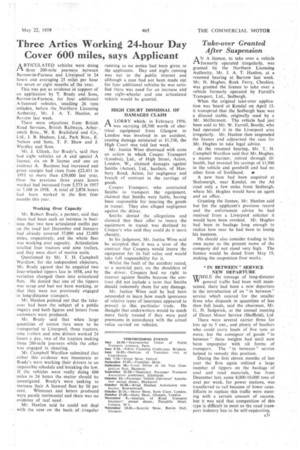Three Artics Working 24-hour Day Cover 600 miles, says Applicant
Page 33

If you've noticed an error in this article please click here to report it so we can fix it.
ARTICULATED vehicles were doing three 200-mile journeys between Barrow-in-Furness and Liverpool in 24 hours and averaging 25 miles per hour for seven or eight months of the 'year.
This was put as evidence in support of an application by T. Brady and Sons, Barrow-in-Furness, for four. additional A-licensed vehicles, totalling 26 tons unladen, before the Northern . Licensing Authority, Mr. J. A.' T. Hanlon, at Barrow last week. .
There' Were objections from British Road Services, British RailWays, Ather, smith Bros., .W. R: Brailsford and Co., Ltd., J. B. Hudson, Ltd., Park Bros., E. Nelson and Sons, T. F. Shaw and J. Wardley and Sons.
Mr. J. Ullock„ for Brady's, said they had eight vehicles on A and special A licence, six rib B licence and one on contract A. Business had increased and gross receipts had risen from £22,411 in 1955 to more than £39,000 last year. Over the previous three years hours worked had increased from 5,573 in 1957 to 7,108 in 1958. A total of 2,876 hours had been worked in the first, four months this year.
Working Over Capacity Mr. Robert Brady, a partner, said that 'there had been such an increase in business that two new articulated outfits put on the road last December and January had already covered 37,000 and 32,000 miles, respectively, and the whole fleet was working over capacity. Articulation totalled four tractors and nine trailers, and they were short of motive units.
Questioned by Mr, T. H. Campbell Wardlaw,' for the independent objectors, Mr. Brady agreed that he acquired two four-wheeled tippers late in 1958, and by variation changed them into articulated flats. He denied that one of the tippers was scrap and had not been working, or that they were not previously engaged in long-distance transport.
Mr. Hanlon pointed out that the takeover had been the subject of a public ' inquiry and both figures and letters from customers were produced.
Mr. Brady said that when large quantities of cotton tiers were to be transported to Liverpool, three tractors, nine trailers and nine drivers worked 24 hours a day, two of the tractors making three 200-mile journeys while the other was engaged in shunting.
Mr. Campbell Wardlaw submitted that either this evidence was inaccurate or Brady's were working their drivers to an impossible schedule and breaking the law. If the vehicles were really doing 600 miles in 24 hours the matter should be investigated. Brady's were seeking to increase their A licensed fleet by 50 per cent. Witnesses and letters produced were purely testimonial and there was no evidence of real need.
Mr. Hanlon said he could ndt deal with the case on the basis. of irregular running as no notice had been given to the applicants. Day and night running was not in the public interest and although a case had not been made out for four additional vehicles he was satisfied there was need for an increase and one eight-wheeler and one articulated vehicle would be granted.
HIGH COURT DISMISSAL OF DAMAGES CLAIM
PAA LORRY which, in February 1956, was carrying £8,500 worth of electrical equipment from Glasgow to London was involved in an accident, causing damage estimated at £1,338, the High Court was told last week.
Mr. Justice Winn dismissed with costs an action in which Coupar Transport (London), Ltd., of High Street, Acton, London, W.; claimed damages against Smiths (Acton), Ltd., hauliers, of Hanbury Road, Acton, for negligence and breach of contract in the carriage of goods.
Coupar Transport, who contracted Smiths to transport the equipment, claimed that Smiths were liable, having been responsible for insuring the goods in transit. They also alleged negligence against the driver.
Smiths denied the allegations and claimed that their offer to insure the equipment in transit was declined by Coupar's who said they could do it more cheaply.
In his judgment, Mr. Justice Winn said he accepted that it was a term of the contract that Coupars would insure the equipment for its full value and would take full responsibility for it.
Whilst the fault of the accident rested, to a material part, on the shoulders of the driver, Coupars .had no right to recover against Smiths because the contract did not include a term that Smiths should indemnify them for any damage.
Mr. Justice Winn said he had been astounded to learn how much ignorance of relative types of insurance appeared to prevail in this particular trade. He thought that underwriters would be much more fairly treated if they were paid premiums in accordance with the actual value carried on vehicles.


































































































